

Foreign Investors Will Miss out If They Don't Invest in Brazil Soon, Says Abilio - 14/01/2020 - Business. Businessman Abilio Diniz said he does not doubt that the foreign investor will arrive.
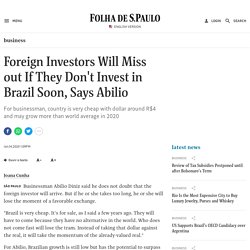
But if he or she takes too long, he or she will lose the moment of a favorable exchange. "Brazil is very cheap. It's for sale, as I said a few years ago. US economy avoids a recession for the longest time ever. There’s a saying among economists that “expansions don’t die of old age.”
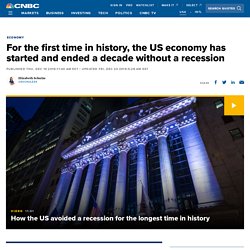
In the case of the American economy over the past decade, it rings true. As of December, the U.S. economy has expanded for a record 126 straight months, the longest time period in the country’s history according to the National Bureau of Economic Research. Put another way, the U.S. has avoided a recession for an entire calendar decade for the first time ever. “It is unusual that this has been such a persistent recovery,” Michelle Meyer, chief U.S. economist at Bank of America Merrill Lynch, told CNBC. Stock Markets Failed To Rally On China Trade Deal, Here’s Why. Topline: Although the U.S. and China have finally agreed on an initial deal that’s expected to defuse the 19-month-long trade war and result in a rollback of both existing and scheduled tariffs, the stock market didn’t surge on the news.
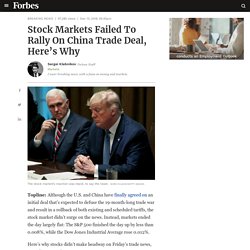
Instead, markets ended the day largely flat: The S&P 500 finished the day up by less than 0.008%, while the Dow Jones Industrial Average rose 0.012%. Here’s why stocks didn’t make headway on Friday’s trade news, according to market experts: The market may have already priced in expectations for an agreement prior to Friday: “Stocks already ran up 7% in just the past two months alone on the belief that a deal would be signed,” notes Chris Zaccarelli, chief investment officer at Independent Advisor Alliance.Some experts remain wary: "The devil remains in the details,” points out Bankrate senior economic analyst Mark Hamrick.
Crucial quote: “Is this deal enough to give the US economy an added lift?
Financial System Stability Committee issues statement on financial stability. KINGSTON, Jamaica — The Financial System Stability Committee (FSSC) says it has reviewed the Bank of Jamaica's June 2019 Macroprudential Policy Report and noted that threats to the financial system remained tempered within the context of a generally favourable domestic macroeconomic environment.
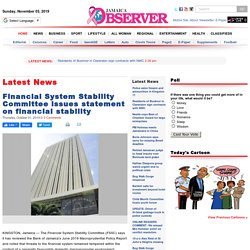
The statement was made at a committee meeting yesterday. “While Jamaica's economic growth is expected to slow and there are headwinds from the global economy, Bank of Jamaica's stress tests show that the Jamaican financial system is resilient to macroeconomic and financial shocks. The regulated financial institutions have adequate capital and other key indicators of financial soundness, such as profitability and liquidity, have remained relatively stable,” FSSC said. “While non-performing loans as a share of total loans provided by banks to the private sector is low and declining, the FSSC continues to monitor the debt sustainability of borrowers. US jobs growth beats forecasts despite GM strike impact. Image copyright AFP US employment was more resilient than expected in October despite the impact of strike action at General Motors.
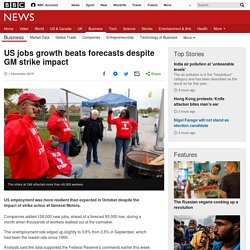
Companies added 128,000 new jobs, ahead of a forecast 85,000 rise, during a month when thousands of workers walked out at the carmaker. View: Economics needs a post-crash revolution. By Mervyn King.
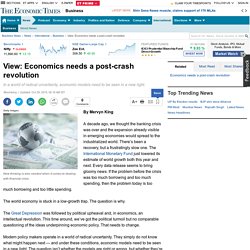
Why Poor People Stay Poor: A Study of Urban Bias in World Development. By Michael Lipton. Temple-Smith: London, 1977. Pp. 467. £9.50. The super rich elite have more money than they know what to do with. This is an update to correct an error.
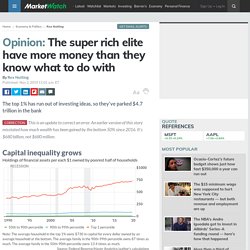
An earlier version of this story misstated how much wealth has been gained by the bottom 50% since 2016. It’s $680 billion, not $680 million. Forget all those phony fairy tales about whether a couple who makes $350,000 is rich or poor (they are neither), and focus on the big picture: Half of Americans have almost nothing while a small fraction have almost all the capital. - Are you a robot? Chile Learns the Price of Economic Inequality. Chile is often praised as a capitalist oasis, a prospering and stable nation on a continent where both prosperity and stability have been in short supply.
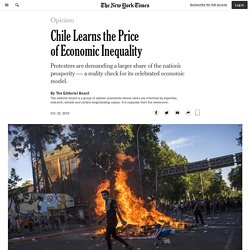
Chile Learns the Price of Economic Inequality. A checklist for maximizing reproducibility of ecological niche models. Bill Gates: 'Economists don't actually understand macroeconomics' Bill Gates takes a dim view of economists’ ability to know what’s going on in the economy.
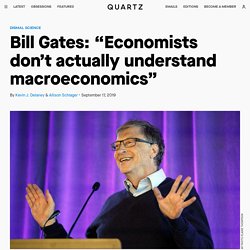
“Too bad economists don’t actually understand macroeconomics,” the Microsoft co-founder noted during a recent interview with Quartz. Asked what he meant by that, Gates continued: “It’s not like physics where you take certain inputs and you predict certain outputs. Will interest rates ever return to normal, and why aren’t they returning to normal? You won’t get a consensus between economists quite the way that if you dropped a ball out your window and called up physicists and asked, ‘What the hell happened?’